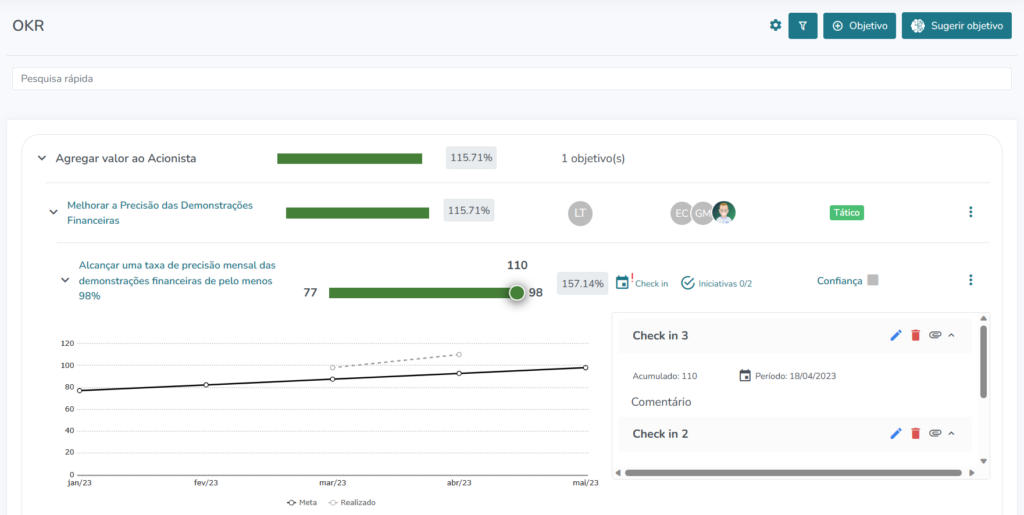Discover the main benefits of OKR to boost your company's success! In a highly competitive market and with managers facing countless responsibilities on a daily basis, effective goal management has become essential for overcoming obstacles and standing out in business.
In this post, we'll explore how the OKR methodology can turn your goals into positive results, reduce risks and make the most of opportunities. Get ready to learn about the advantages of OKR and how it can boost your company's success. Have a good read!
What you will find on this blog:
ToggleWhy should OKR be part of your company's culture?

OKR is a powerful methodology that can bring many benefits and even boost a company's success by focusing on measurable results and clear objectives. By setting challenging goals and defining key results that indicate progress towards these objectives, organizations can create an engaging and success-oriented work environment.
With OKRs, employees have a clear understanding of what the company's goals are and how their work contributes to those goals. This creates a sense of purpose and motivation, as they can see the direct impact of their actions on the overall success of the organization.
In addition, OKR's results-based approach allows for greater monitoring and measurement of progress. With measurable metrics and indicators defined as key results, you can closely monitor performance and adjust strategies as necessary. This helps you quickly identify what is working and what needs to be improved, allowing for more informed and effective decision-making.
However, it is important to remember that the success of OKR lies not only in the implementation of the methodology itself, but in the way it is adopted and executed. It requires an ongoing commitment to setting ambitious goals, monitoring them properly and adapting as challenges and opportunities arise. So here are 10 benefits that OKR can bring to your company when applied properly.
Looking for strategic management software? Get to know Tune!
10 benefits of OKR
Next, we'll focus on the 10 benefits of OKR, which range from improving employee performance to increasing agility and organizational alignment.

1- Improves employee performance:
By using this methodology, the goals are measurable but at the same time challenging, which motivates employees to achieve greater results. For example, an employee in a consulting company might have an OKR to increase the number of successfully completed projects by 30% in the quarter. This specific and challenging target drives the employee to dedicate themselves and look for innovative solutions to achieve the set goal.
2- Encourages communication:
OKRs promote effective communication between teams, as everyone is clear about what each sector needs to accomplish. If a retail company defines an OKR to improve the customer experience, the customer service team can share insights and feedback with the development team to improve the service platform. This continuous, two-way exchange of information allows everyone to work together towards the same goal and also makes it clearer what each sector needs to do, providing the right communication to the right people.
3- Helps the leader:
El OKR ayuda a los directivos a comprender los retos y las necesidades de sus equipos, lo que les permite ofrecerles el apoyo adecuado. Por ejemplo, si un directivo detecta que el equipo de marketing tiene dificultades para generar clientes potenciales cualificados, puede proporcionar recursos adicionales, formación o ajustar los objetivos de OKR para hacerlos más realistas. Esto fortalece la relación entre líderes y empleados y fomenta un entorno de trabajo más colaborativo.
4- Promotes the company's development:
By setting a few objectives at a time and in a short timeframe, OKR allows the company to focus on the most relevant goals at the moment, avoiding dispersion of effort. For example, a software company might set an OKR to increase its user base by 20% over the next three months. This directs the entire team towards specific actions aimed at user growth, such as product improvements, marketing strategies and customer service.
5- Strategically aligns teams:

One of the advantages of OKRs is the strategic alignment of teams. Based on what is defined as the company's goal, each team can create its own OKRs that will be connected to each other. Even with different skills and performances, the teams will be part of the same organizational culture and will have the same objective. In other words, with OKR, each team can create its own objectives that are aligned with the company's main goal.
6- It generates cross-functional teams:
The transparency provided by OKR allows employees to see what other teams need and are doing, boosting collaborative work. Employees from different areas can help each other in pursuit of the same main objective, optimizing time and stimulating creativity in the company.
7- It shows transparency in the processes:
OKR promotes transparency in processes, which is an important value for organizations. It promotes psychological safety and creates a cohesive organizational culture. All employees gain a broad view of the company, of each employee's objectives and of each employee's results and progress. This increases the perception of importance and employee satisfaction in the company.
8- Promotes innovation:
With clear objectives, employees believe in the potential of their tasks and strive to produce quality. This opens up space for innovation and creativity in your processes. In addition, the ease of communication provided by OKR allows employees to exchange information with colleagues and create surprising solutions for everyone.
9- Allows continuous monitoring:
OKRs make it easier to constantly monitor the progress of teams. With this methodology, a leader can hold weekly or fortnightly meetings to review the progress of the OKRs, ask questions such as "Is the path to achieving the objective correct? Are there any gaps?" and analyze the relevant data to assess progress. This allows for a proactive approach to solving problems, adjusting targets and ensuring that the objectives set are met.
10 – It creates learning cycles:
With short OKR cycles, the company can learn from mistakes and quickly change its processes to improve performance. For example, if a research and development department sets an OKR to launch a new product in six months, but faces technical challenges, they can assess what went wrong, adjust the plan and apply the lessons learned in future cycles. This allows for a process of continuous learning and constant improvement
Improve the effectiveness of OKR with a multi-methodological platform
After understanding the benefits of using OKR, you may be wondering how you can centralize all the results provided by the methodology in your company in one place, given the use of spreadsheets and the use of different management methodologies in each area? Then it's time to consider hiring specialized management software, such as Tune.
Tune is a complete software from ActioThis is a tool that centralizes all the company's needs, both in terms of development and in terms of monitoring performance and results. It offers different methodologies, such as BSC, OKR, PDCA, ESG and others, so you can choose the one that best suits your organization's needs.
Check out the image below to see how OKR is represented in Tune:

Remember: with Tune it is possible to boost the performance of all teams, seeking excellence, success and quality in processes. After all, the platform allows you to boost results based on data and methods that make management more strategic. What's more, now that we have integrated ChatGPT into our solutions, Tune has a virtual consultant using artificial intelligence to guide you in identifying causes, guaranteeing results and methodological consistency in your processes. Don't forget to follow Actio on Instagram, Linkedin and Facebook.







